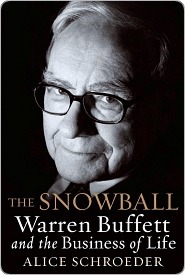More on this book
Community
Kindle Notes & Highlights
Read between
February 4 - July 31, 2020
“In the short run, the market is a voting machine. In the long run, it’s a weighing machine.
“The man said to the woman, ‘There are certain things that cannot be adequately explained to a virgin either by words or pictures.
His shrilling nerves were urging him to fight back. Instead, he did nothing. He did not respond.
Making a sale was tempting, but not tempting enough to change his mind.
And the biggest thing I wanted to do was work for myself. I didn’t want other people directing me. The idea of doing what I wanted to do every day was important to me.”
“you cannot possibly succeed until you start.
Know what the deal is in advance.17
Rule number one: Don’t criticize, condemn, or complain. This idea riveted Warren. Criticism was something he knew everything about.
Everybody wants attention and admiration. Nobody wants to be criticized.
The sweetest sound in the English language is the sound of a person’s own name.
The only way to get the best of an argument is to avoid it.
If you are wrong, admit it quickly and emphatically.
Ask questions instead of giving direct orders.
Give the other person a fine reputation to live up to.
Call attention to people’s mistakes indirectly. Let the other person save face.
thinking of a stock’s value mostly in terms of what the company would be worth if dead—that is, shut down and liquidated.
Now Howard’s struggles branded three principles even deeper into his son: that allies are essential; that commitments are so sacred that by nature they should be rare; and that grandstanding rarely gets anything done.
When things went wrong, Munger would set out toward new goals rather than let himself dwell on the negative.
he had made the partners so much money that they were no longer simply happy; many regarded him with awe.
He often paraphrased Graham, saying: “Be fearful when others are greedy, and greedy when others are fearful.” This was the time to be greedy.
Graham’s flaw, Munger felt, was that he considered the future “more fraught with hazard than ripe with opportunity.”25 Munger began trying to wean Buffett away from Graham’s dreary pessimism, which underlay the drudgery of stooping for cigar butts and sucking out their last puff.
Buffett would later write to the partners that buying “the right company (with the right prospects, inherent industry conditions, management, etc.)” means “the price will take care of itself....This is what causes the cash register to really sing. However, it is an infrequent occurrence, as insights usually are, and of course, no insight is required on the quantitative side—the figures should hit you over the head with a baseball bat. So the really big money tends to be made by investors who are right on qualitative decisions.”
Time is the friend of the wonderful business, the enemy of the mediocre....It’s far better to buy a wonderful company at a fair price than a fair company at a wonderful price.
Good jockeys will do well on good horses but not on broken-down nags.
he showed great loyalty to longtime friends. People were especially struck by his fundamental honesty.
The bank, he stressed, was not a charity or social-services agency.
snorted to himself over this notion and refocused her. “You know, good journalism is not inconsistent with good profits, or something like that.
“In this business,” Ruane said, “you have the innovators, the imitators, and the swarming incompetents.
“If a policeman follows you down the road for five hundred miles,” he said to Buffett, “you’re going to get a ticket.”
He helped her understand that it was always a mistake to pay too much for something you wanted. Impatience was the enemy.


